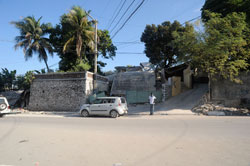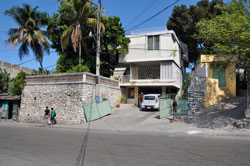
| Vol.
XXII No.
3 January / February 2010 |
| contents |
| Printable Version |
Responding to the Earthquake:
A Workshop, Lecture Series, and More

(house in which author's aunt was killed) (click on image to enlarge)
News of the 7.0 earthquake of January 12 in Port-au-Prince, Haiti, rang as a call to action. As I began calling colleagues from across the Institute to organize discussion meetings, I learned that I too had suffered losses in my family. This realization only added resolve to my decision to act, drawing from a belief that knowledge carries responsibilities.
Following conversations with Prof. Michel DeGraff, whose many losses included relatives, friends, and colleagues (a tragic fact that is now common across Haitian communities everywhere), a series of meetings was promptly arranged to discuss the earthquake’s aftermath, identify some of the most urgent problems that we at MIT could tackle, and strategize sensible contributions to both short- and long-term relief and rebuilding efforts. As one outcome of these meetings, Prof. Christopher Csikszentmihalyi and I developed an IAP workshop to discuss technological innovations relevant to the epic disaster.
The four-day IAP workshop took place on January 19-22 and centered around evolving contributions of media technologies to rescue efforts (e.g., Google PeopleFinder, an Internet service that played an important role in the rescue efforts, and the “4636” SMS short code that allowed the broadcast and translation of SMS alert messages through crowd sourcing). The IAP group identified communication and energy as key factors in the upcoming nation rebuilding efforts and discussed potential solutions to the environment-related energy problems. Near the end of the workshop, it became clear that a well-designed selection of communication, coordination, and energy challenges could be addressed within the MIT community with relatively immediate and noticeable impact.
As a result of the IAP session, two Media Lab students, Aaron Zinman and Greg Elliott, began designing what they termed SkillSetFinder, an Internet service that would use cellular telephony to efficiently collect and disseminate information about personal skills. Such service is in the spirit of the culturally-rooted Haitian tradition called konbit, where people help one another by sharing their skills pro bono toward the completion of various tasks in a communal fashion. We anticipate that the development of SkillSetFinder will contribute to rebuilding efforts.
A group of students outside of the IAP workshop, led by Nadya Peek, Keith Berkoben, and Amy Sun, began careful planning of a fabrication laboratory (“Fab Lab”) to be located in Haiti.
These laboratories provide the tools needed to create custom precision parts, an important service when rebuilding partially destroyed objects and even for creating prosthetics, an urgent need after the earthquake. Such laboratories are meant to be operated by the local community and thus can serve both as educational tools and as agents for empowerment.
In setting the stage for longer-term discussion and projects, we launched a lecture series focused on Haiti that began with an evening with Prof. Noam Chomsky. In addition, Prof. Barry Vercoe and I crafted a class, MAS963 Special Projects: New Media for Haiti, which is being offered now, in spring term 2010. This class discusses the historical, socio-political, economic, cultural, and linguistic backdrops in Haiti at the time of the earthquake, and then seeks to identify which post-earthquake problems can be tackled, even in preliminary fashion, in the course of the semester.
The class is both a discussion and project class, with many guest lectures, including crucial contributions from Prof. DeGraff about the role of language and education in any solution to Haiti’s socio-economic and political problems. Other essential contributions to the new class will explore the roles of technology, economics, civic engagement, innovative teaching methods, and self-expression in the rebuilding of a better Haiti. Students are expected to select projects to be completed and tested in Haiti in the last week of April.
These activities, I hope, mark the beginning of a long-term MIT-wide engagement with the people of Haiti, a country that has lost much of its political, educational, economic, and public-health infrastructures, in addition to the unprecedented loss of life. The forthcoming ground-up rebuilding efforts present unique opportunities for cutting-edge institutions such as MIT to make substantial contributions to relief efforts and reconstruction plans. In turn, such contributions will provide extraordinary learning opportunities to students and faculty. Coincidentally, the main factors needed to jump-start Haiti, rebuild its infrastructure, and improve the fabric of its society – namely energy, fabrication, communication and education – happen to also be MIT’s strengths. These formidable challenges will also give MIT an exceptional avenue to further its global leadership in these areas.
If you would like to be involved or need additional information on related classes or projects, please visit the Website krikkrak.media.mit.edu or e-mail me. We hope to garner enough enthusiasm to elicit, support, and coordinate long-term, sustainable projects from across the Institute.
| Back to top | |
| Send your comments |
| home this issue archives editorial board contact us faculty website |
